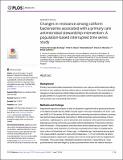Changes in resistance among coliform bacteraemia associated with a primary care antimicrobial stewardship intervention : a population-based interrupted time series study
Abstract
Background: Primary care antimicrobial stewardship interventions can improve antimicrobial prescribing, but there is less evidence that they reduce rates of resistant infection. This study examined changes in broad-spectrum antimicrobial prescribing in the community and resistance in people admitted to hospital with community-associated coliform bacteraemia associated with a primary care stewardship intervention. Methods and findings: Segmented regression analysis of data on all patients registered with a general practitioner in the National Health Service (NHS) Tayside region in the east of Scotland, UK, from 1 January 2005 to 31 December 2015 was performed, examining associations between a primary care antimicrobial stewardship intervention in 2009 and primary care prescribing of fluoroquinolones, cephalosporins, and co-amoxiclav and resistance to the same three antimicrobials/classes among community-associated coliform bacteraemia. Prescribing outcomes were the rate per 1,000 population prescribed each antimicrobial/class per quarter. Resistance outcomes were proportion of community-associated (first 2 days of hospital admission) coliform (Escherichia coli, Proteus spp., or Klebsiella spp.) bacteraemia among adult (18+ years) patients resistant to each antimicrobial/class. 11.4% of 3,442,205 oral antimicrobial prescriptions dispensed in primary care over the study period were for targeted antimicrobials. There were large, statistically significant reductions in prescribing at 1 year postintervention that were larger by 3 years postintervention when the relative reduction was −68.8% (95% CI −76.3 to −62.1) and the absolute reduction −6.3 (−7.6 to −5.2) people exposed per 1,000 population per quarter for fluoroquinolones; relative −74.0% (−80.3 to −67.9) and absolute reduction −6.1 (−7.2 to −5.2) for cephalosporins; and relative −62.3% (−66.9 to −58.1) and absolute reduction −6.8 (−7.7 to −6.0) for co-amoxiclav, all compared to their prior trends. There were 2,143 eligible bacteraemia episodes involving 2,004 patients over the study period (mean age 73.7 [SD 14.8] years; 51.4% women). There was no increase in community-associated coliform bacteraemia admissions associated with reduced community broad-spectrum antimicrobial use. Resistance to targeted antimicrobials reduced by 3.5 years postintervention compared to prior trends, but this was not statistically significant for co-amoxiclav. Relative and absolute changes were −34.7% (95% CI −52.3 to −10.6) and −63.5 (−131.8 to −12.8) resistant bacteraemia per 1,000 bacteraemia per quarter for fluoroquinolones; −48.3% (−62.7 to −32.3) and −153.1 (−255.7 to −77.0) for cephalosporins; and −17.8% (−47.1 to 20.8) and −63.6 (−206.4 to 42.4) for co-amoxiclav, respectively. Overall, there was reversal of a previously rising rate of fluoroquinolone resistance and flattening of previously rising rates of cephalosporin and co-amoxiclav resistance. The limitations of this study include that associations are not definitive evidence of causation and that potential effects of underlying secular trends in the postintervention period and/or of other interventions occurring simultaneously cannot be definitively excluded. Conclusions: In this population-based study in Scotland, compared to prior trends, there were very large reductions in community broad-spectrum antimicrobial use associated with the stewardship intervention. In contrast, changes in resistance among coliform bacteraemia were more modest. Prevention of resistance through judicious use of new antimicrobials may be more effective than trying to reverse resistance that has become established.
Citation
Hernandez-Santiago , V , Davey , P G , Nathwani , D , Marwick , C A & Guthrie , B 2019 , ' Changes in resistance among coliform bacteraemia associated with a primary care antimicrobial stewardship intervention : a population-based interrupted time series study ' , PLoS Medicine , vol. 16 , no. 6 , e1002825 . https://doi.org/10.1371/journal.pmed.1002825
Publication
PLoS Medicine
Status
Peer reviewed
ISSN
1549-1277Type
Journal article
Description
VHS was supported by a Scottish Government Chief Scientist Office (https://www.cso.scot.nhs.uk/) Clinical Academic Training Fellowship (Grant reference number: CAF/12/07) for the duration of this work.Collections
Items in the St Andrews Research Repository are protected by copyright, with all rights reserved, unless otherwise indicated.

